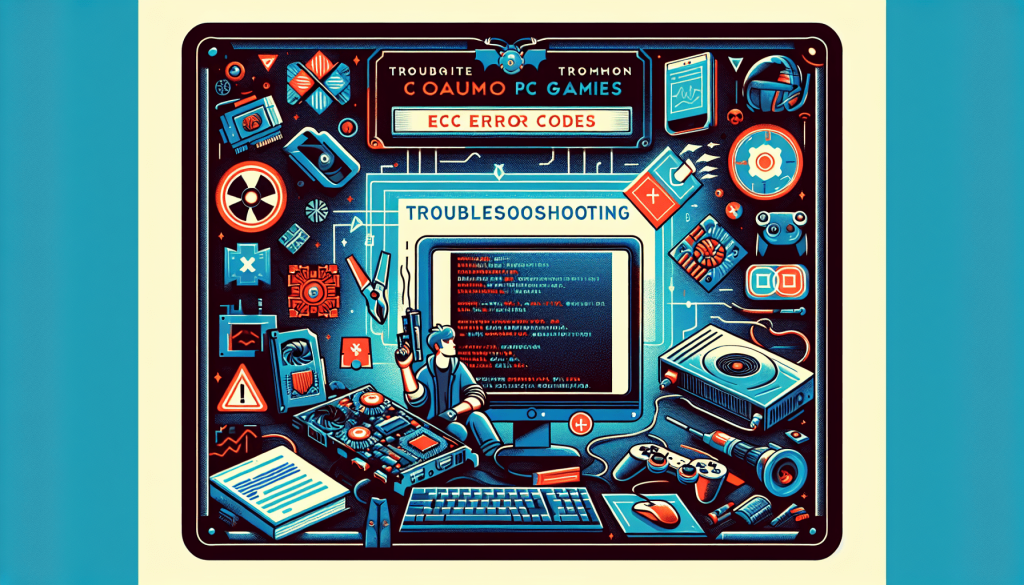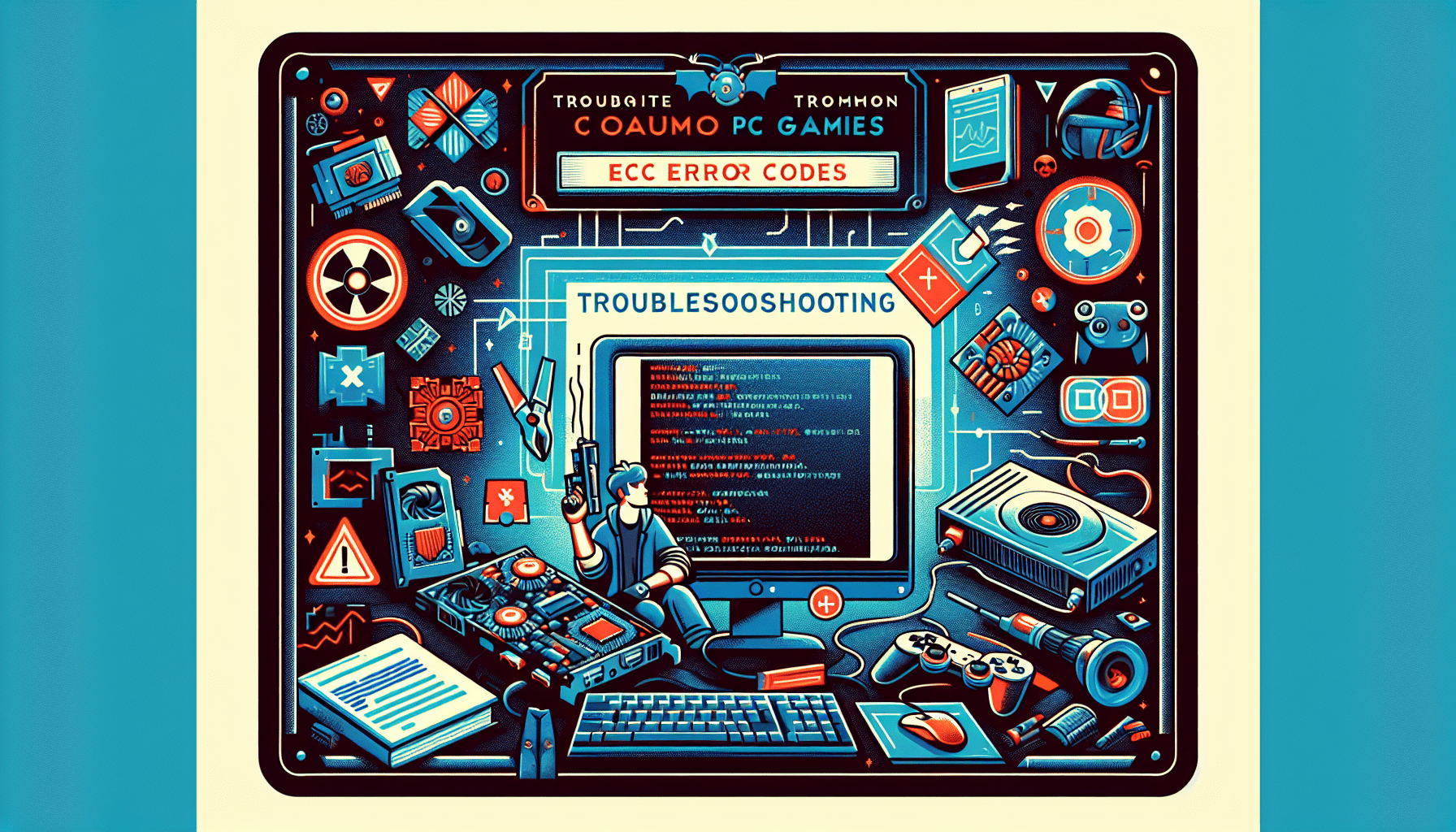In the fast-paced world of PC gaming, encountering error codes can be a frustrating and time-consuming experience. From blue screens of death to DirectX errors, these codes can halt your gaming progress and leave you scratching your head. However, fear not, as this article serves as your comprehensive guide to troubleshooting common PC gaming error codes. Whether you are a seasoned gamer or a newbie, this article equips you with the knowledge and strategies needed to overcome these obstacles, allowing you to get back in the game swiftly and smoothly.

Introduction
PC gaming has become increasingly popular in recent years, with gamers worldwide spending countless hours immersed in virtual worlds. However, even the most dedicated gamers occasionally encounter error codes that can disrupt their gaming experience. Understanding and troubleshooting these error codes is essential to ensure smooth gameplay and prevent frustration. This article provides a comprehensive guide to common PC gaming error codes, preventive measures to avoid encountering them, and troubleshooting tips to resolve these issues efficiently.
Definition of PC gaming error codes
PC gaming error codes are numerical or alphanumeric messages displayed when something goes wrong during gameplay. These error codes serve as a diagnostic tool, providing information about the cause of the problem and guiding users in finding a solution. They may be displayed as pop-ups, in-game error messages, or in system logs. By decoding these error codes, gamers and technicians can identify the underlying issues and take appropriate steps to resolve them.
Importance of troubleshooting errors
Troubleshooting PC gaming error codes is crucial for maintaining an optimal gaming experience. These error codes are indicators of underlying issues that, if left unresolved, can result in crashes, game freezes, or even system damage. By taking the time to troubleshoot and resolve these error codes, gamers can prevent future disruptions and enjoy uninterrupted gameplay. Additionally, resolving error codes can help gamers identify potential hardware or software issues, allowing them to take corrective actions to avoid further problems.
Preventive Measures
To minimize the occurrence of PC gaming error codes, it is essential to implement preventive measures. By following these preventive measures, gamers can reduce the likelihood of encountering common error codes and ensure a smoother gaming experience.
Keeping hardware drivers up to date
One of the primary causes of PC gaming error codes is outdated or incompatible hardware drivers. Drivers act as the communication link between hardware components and the operating system. Regularly updating drivers, especially graphics card drivers, ensures compatibility with the latest games and optimizes performance. Gamers can check for driver updates on the manufacturer’s website or use driver update software to automate the process.
Maintaining optimal system temperature
Overheating can cause various PC gaming error codes, such as system crashes and performance degradation. It is crucial to keep the system temperature within acceptable limits by regularly cleaning dust from fans and cooling components, ensuring proper airflow, and considering additional cooling solutions if necessary. Monitoring the system temperature using software tools can provide valuable insights into potential overheating issues.
Regular virus and malware scans
Viruses and malware can interfere with gaming processes and lead to error codes. Gamers should regularly scan their systems using reliable antivirus and anti-malware software to detect and remove any potential threats. Keeping these security programs updated ensures the latest protection against emerging threats and reduces the risk of encountering gaming-related error codes.
Installing the latest game patches
Game developers often release patches and updates to address known issues and improve game performance. By keeping games up to date and installing the latest patches, gamers can minimize the occurrence of error codes related to known bugs or vulnerabilities. Most games have built-in update mechanisms, or players can manually download patches from the developers’ websites or through gaming platforms like Steam.
Using compatible hardware and software
Incompatibility between hardware components or software can lead to error codes during gameplay. Gamers should ensure that their system meets the minimum requirements specified by game developers. Additionally, using compatible peripherals, such as controllers or keyboards, can prevent compatibility-related error codes. Researching hardware and software compatibility and consulting user forums or customer support can provide valuable insights before making any purchases.
Common PC Gaming Error Codes
Despite implementing preventive measures, PC gaming error codes can still occur. Understanding the most common error codes allows gamers to troubleshoot and resolve issues effectively. The following are some frequently encountered error codes and their respective solutions.
BSOD (Blue Screen of Death) error codes
BSOD error codes typically indicate severe system errors that cause the operating system to crash. These errors are accompanied by a blue screen and an error code. Understanding these error codes can help determine the cause and appropriate troubleshooting steps. Common BSOD error codes include:
Understanding BSOD error codes
BSOD error codes are numeric values that indicate the type and cause of the system failure. Each error code corresponds to a specific error condition, such as memory issues, driver conflicts, or hardware failures. By researching the specific error code, gamers can gain insight into the underlying cause and potential solutions.
Troubleshooting BSOD errors
To troubleshoot BSOD errors, gamers can start by identifying the recently installed hardware or software that may have triggered the issue. Uninstalling or updating these conflicting components can often resolve the problem. Additionally, conducting a system restore to a previous stable state or using system repair tools, such as Windows’ built-in Startup Repair, can help resolve BSOD errors. If the issue persists, seeking professional assistance may be necessary.
DLL Errors
DLL (Dynamic Link Library) errors occur when a required DLL file is missing or corrupted. These errors can prevent games from launching or cause unexpected crashes during gameplay.
Causes of DLL errors
DLL errors can be caused by various factors, such as:
- Corrupted or missing DLL files
- Incomplete software installations or updates
- Incompatible software versions or installations
- Malware infections or system crashes
Fixing DLL errors
To fix DLL errors, gamers can try reinstalling the game or software associated with the DLL error. If the error persists, manually replacing the corrupted or missing DLL file from a trusted source may resolve the issue. Using system restore to revert to a previous stable state before the DLL error occurred can also be effective. For persistent DLL errors, advanced troubleshooting or seeking professional assistance may be necessary.
Runtime Errors
Runtime errors occur during gameplay and typically result from problems with software or compatibility issues.
Causes of runtime errors
Runtime errors can be caused by various factors, including:
- Incompatible or outdated software versions
- Missing or corrupt system components
- Memory issues or conflicts
- Problems with specific game files
Troubleshooting runtime errors
To troubleshoot runtime errors, gamers can try reinstalling or updating the game, ensuring compatibility with the operating system and other software components. Verifying the integrity of game files through platform-specific tools or reinstalling missing system components, such as DirectX or Visual C++ redistributables, can also help resolve runtime errors. If the issue persists, reaching out to game developers’ support forums or contacting customer support may provide further assistance.
DirectX Errors
DirectX errors occur when there is a problem with the DirectX software framework, which is essential for running most PC games.
Identifying DirectX errors
DirectX errors are often accompanied by error codes and error messages that indicate the specific problem. Common DirectX errors include:
- “DirectX encountered an unrecoverable error”
- “Missing or outdated DirectX”
Solutions for DirectX errors
To resolve DirectX errors, gamers can start by updating their DirectX version to the latest available. This can be done by running Windows Update or manually downloading and installing the DirectX End-User Runtime from Microsoft’s website. Verifying the integrity of game files, updating graphics card drivers, and ensuring compatibility with the game’s recommended DirectX version can also help resolve these errors. Reinstalling the game or seeking technical support may be necessary if the issue persists.
Game Launch Errors
Game launch errors occur when games fail to start or encounter issues during the launch process.
Failed to start game
Causes for games failing to start can include:
- Incompatible or missing game files
- Permission issues or antivirus/firewall interference
- Insufficient system resources or conflicting software
Game crashes upon launch
Game crashes immediately after launch can be caused by:
- Incompatible hardware or drivers
- Conflicting software or background processes
- Corrupted game data or settings
Error connecting to game server
Error messages related to server connection issues can result from:
- Internet connectivity problems
- Server maintenance or downtime
- Network firewall or proxy settings
General Troubleshooting Tips
In addition to specific troubleshooting steps for common error codes, there are general tips that gamers can follow when encountering any PC gaming error.
Restarting the computer
Rebooting the computer can resolve temporary glitches or conflicts that may be causing error codes. It clears system memory and refreshes various components, potentially resolving minor issues.
Updating graphics card drivers
Graphics card drivers play a crucial role in PC gaming. Ensuring that graphics card drivers are up to date can help prevent a wide range of error codes related to graphics rendering issues, crashes, or compatibility problems.
Verifying game files
Many gaming platforms, such as Steam, provide built-in tools to verify the integrity of game files. Running these tools can detect and repair corrupted or missing files, resolving errors that arise from faulty game installations or updates.
Performing a clean boot
A clean boot minimizes background processes and services, ensuring that the game has maximum system resources available to run smoothly. Disabling unnecessary startup items, disabling non-essential services, or performing a selective startup can help identify and resolve errors caused by conflicts with other software or processes.
Checking system requirements
Before installing or running a game, it is essential to verify that the system meets the minimum requirements specified by the game’s developers. Inadequate hardware specifications can lead to various error codes and poor game performance.
Conclusion
Troubleshooting PC gaming error codes is essential for maintaining an optimal gaming experience. By understanding the most common error codes, implementing preventive measures, and following general troubleshooting tips, gamers can effectively resolve various issues that may arise during gameplay. However, it is important to seek professional assistance if the error codes persist or if there is a need for specialized expertise. By taking the time to troubleshoot error codes and resolve underlying issues, gamers can ensure a smooth and enjoyable gaming experience.
